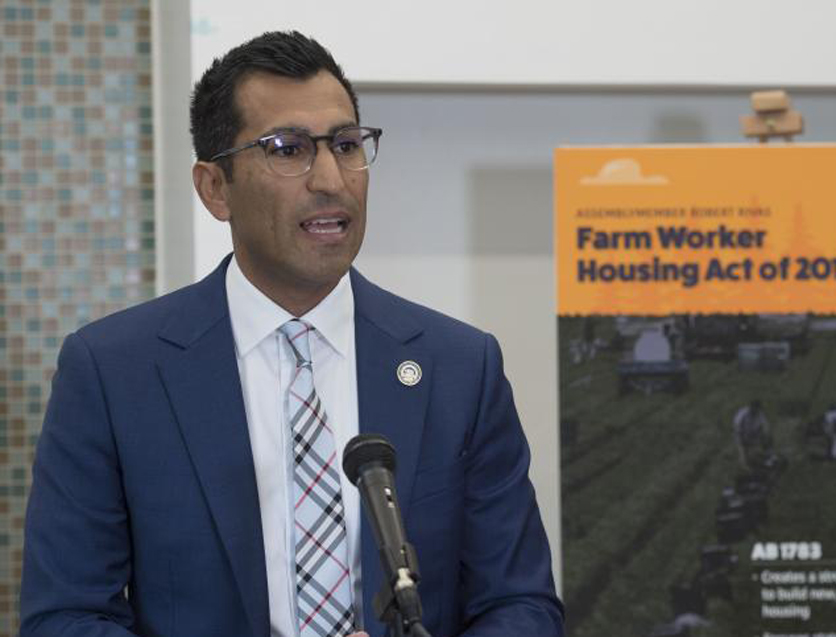A new proposal in the Legislature aims to support farmworkers and disadvantaged farmers while promoting climate-resilient farming practices. The measure also applies lessons learned from the pandemic to policies for bolstering the supply chain to food banks and food programs to better prepare the state for the next natural disaster.
“It's time that we invest, it’s time that we improve and build a foundation for a better food system here in California to one that is more resilient, one that is more sustainable, and one that is more just,” said Assembly Agriculture Chair Robert Rivas of Hollister, author of the measure, Assembly Bill 125.
The title of the bill encompasses the broad range of provisions within the proposal. The Equitable Economic Recovery, Healthy Food Access, Climate Resilient Farms and Worker Protection Bond Act would put a $3.1 billion bond measure on the November 2022 ballot.
The bond would allocate $570 million to CDFA for increasing capacity for emergency food distribution through investments in cooling, storage and processing infrastructure. Another $270 million would address food infrastructure, specifically in procuring California-grown foods for local communities. More than $1 billion would support food access, infrastructure for school nutrition programs, emergency food grants and senior nutrition programs.
“We look to connect small to mid-scale producers with people experiencing hunger through system changes in food production, processing, distribution, marketing and access to healthy foods with a focus on equity,” said Andy Naja-Riese, CEO of the Agricultural Institute of Marin. “We have within our grasp the ability to eliminate hunger, and we can do this through equitable access to real food grown and produced sustainably and with organic practices.”
Through the bill’s many provisions, organic agriculture is prioritized in the incentives grants and promoted as a sustainable farming practice. Farmers transitioning to organic practices would benefit through $35 million in grants for technical assistance.
The measure builds on CDFA’s suite of climate-smart incentives programs and would add nearly $300 million for promoting healthy soils and water use efficiency. The recycling department would gain $200 million for improving composting facilities and building food recovery projects to drive the composting.
The focus on food needs bridges the urban-rural divide often found in agriculture.

Asm. Robert Rivas, D-Hollister
“The reality is that there's a lot of connection between what's happening in our rural communities and our farming communities,” said Asm. Ash Kalra of San Jose, a co-author of AB 125. “Members of these communities rely on the resources from both regional and statewide farms, as well as local farms, to be able to feed their families.”
Socially disadvantaged farmers and ranchers have a prominent role in the bill as well. Rivas hopes to allocate $125 million to these communities for improving access to agricultural land.
Butte County rancher and former president of the California Cattlemen’s Association Dave Daley praised the $125 million in grants for conservation easements to support the governor’s 30x30 conservation goal, as well as the $10 million that would support grazing for wildfire prevention. Daley describe the “horrific fires” in his region that took most of his herd, destroyed the homes of friends, and took the lives of residents in nearby Paradise.
He was excited to see support for regional food processing, having seen many smaller local meatpacking plants forced to shut down over the years.
Rivas represents a district along the Central Coast with a large farmworker population, and this is reflected in the bill.
Interested in more coverage and insights? Receive a free month of Agri-Pulse West.
“The pandemic has elevated the need for the professional farmworkers and how they've been negatively impacted by COVID-19,” said Cesar Lara, executive director of the Monterey Bay Central Labor Council. “We can no longer take the health and safety of farmworkers for granted.”
AB 125 proposes $450 million for developing farmworker housing units and $50 million for improving indoor air quality and energy efficiency issues related to the use of swamp coolers in areas facing the worst air pollution in the country.
“These swamp coolers bring all the air pollution from the outside to inside the houses,” said Nayamin Martinez, executive director of the Central California Environmental Justice Network. “They do not have proper filtration or ventilation systems.”
Recalling the scramble in 2020 for N95 masks to meet new state air quality requirements when wildfire is present, the bill calls for $25 million to stockpile PPE. The State Water Resources Control Board would dispense another $100 million in grants for safe drinking water projects in farmworker communities. The bill would also support groundwater sustainability through $75 million in grants to local agencies, technical assistance to farmers, and support for small and mid-sized farms and socially disadvantaged farmers in the valley and coastal regions.
Straying further from the bill’s central themes, the bond would allocate $100 million to CDFA to help state and county fairgrounds recover from the pandemic shutdowns. It would also improve the facilities to support emergency operations to the fairgrounds as well as access for local communities and additional facilities for meat processing and commercial kitchens. While the Newsom administration has allocated support to state-affiliated fairs in recent budget proposals, advocates have pushed for county fairs to be included as well.
Rivas stressed that the measure goes beyond recovery and extends to resilience for climate impacts and societal challenges.
“We cannot go back to the way things were,” he said. “We need to ensure that our food system stays healthy—especially healthy in a crisis.”
For more news, go to www.Agri-Pulse.com.


